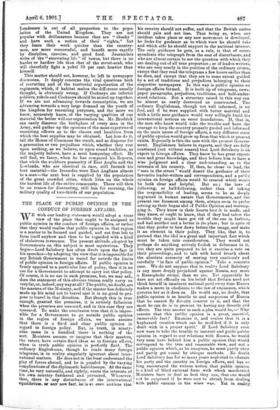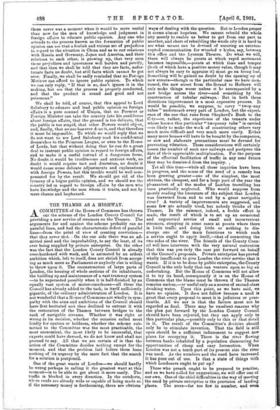THE PLACE OF PUBLIC OPINION IN THE CONDUCT OF FOREIGN
AFFAIRS.
WE wish our leading statesmen would adopt a truer view of the place that ought to be assigned to public opinion in the conduct of foreign affairs, or rather that they would realise that public opinion in that region is a matter to be formed and guided, and not first left to form itself anyhow and then to be regarded with a kind of idolatrous reverence. The present attitude adopted by Governments on this subject is most mysterious. They begin—Lord Salisbury has often dwelt upon the fact in his speeches—by adopting the view that it is impossible for any British Government to travel far outside the limits of public opinion in foreign affairs. If public opinion is firmly opposed to a, particular lino of policy, then it is no use for a Government to attempt to carry out that policy. Of course, it is no use in such premises, but, we may ask, does the statement of this obvious truism really carry us very far, or, indeed, any way at all ? The public, no doubt, are the masters of the Ministry, and if the master has definitely made up his mind not to travel east it is no good to pro- pose to travel in that direction. But though this is true enough, granted the premises, it is entirely fallacious when the premises are unsound, and in this case they are unsound. To make the conclusion true that it is impos- sible for a Government to go outside public opinion in the region of foreign affairs, we must assume that there is a fixed and clear public opinion in regard- to foreign policy. But, in truth, in ninety- nine cases in a hundred there is nothing of the sort. Ministers assume or imagine that their masters, the voters, have certain fixed ideas as to foreign affairs, when in truth public opinion is perfectly fluid. The ordinary Englishman, though he reads many foreign telegrams, is in reality singularly ignorant about inter- national matters. Be does not in the least understand the play of forces abroad, and he is puzzled by the varying complications of the diplomatic kaleidoscope. At the same time, be very naturally, and rightly, wants the interests of his own country• furthered and protected. Whenever, then, there is any disturbance of the international equilibrium. er any new fact, he is at once. anxious that his country should not suffer, and that the British nation should gain and not lose. That being so, when any incident takes place or any new movement is developed, he looks for guidance as to which view he should take and which side he should support in the national interest. The only .guidance he gets, as a rule, is that of corre- spondents who telegraph from the seat of disturbance, and who are almost certain to see the question with which they are dealing out of all true proportion ; or of leader-writers, who are very nearly in the position of the ordinary citizen, except that they read the telegrams a few hours earlier than he does, and except that they are to some extent guided by a set of traditions and prejudices belonging to their respective newspapers. In this way is public opinion on foreign affairs formed. It is built up of telegrams, news- paper paragraphs, prejudices, traditions, and half-under- stood relations. But a structure raised in this way can be almost as easily destroyed as constructed. The ordinary Englishman, though not well informed, is no fool, and if he were supplied with better material and with a little sure guidance would very willingly build his international notions on surer foundations. If, that is, the men who know would take the trouble and have the courage to keep the country properly guided and informed on the main issues of foreign affairs, a very different state of public opinion would grow up from that which at present exists. Especially is this the case with the present Govern- ment. Englishmen believe in experts, and they are fully. convinced (not without reason) that Lord Salisbury is an expert in foreign affairs. They know he has great experi- ence and great knowledge, and they believe him to have a wise judgment and a clear understanding as to the interests of his country. If, then, he chose to lead, the "men in the street" would desert the guidance of their favourite leader-writers and correspondents, and a pubic opinion on foreign affairs would be created which would be both clear and helpful. But no ; the love of following, or .half-following, rather than of taking the responsibility of leading, seems to be so deeply. ingrained in human nature that Governments, and the present one foremost among them, always seem to prefer setting up their bogus idol of Public Opinion and worship. ping it. They know in their hearts how it is made, and they know, or ought to know, that if they had taken the trouble they might have got rid of the one in fashion, and had another and a better in its place; but in spite ot that they prefer to bow down before.the image, and make it an element in their policy. They like, that is, to pretend that the idol is a great and important fact which must be taken into consideration. They would not perhaps do anything actively foolish in deference to it, but they are quite prepared to let it exercise a veto on their proceedings, and to talk with bated breath about the absolute necessity of moving very cautiously and carefully "in face of public opinion." Take a concrete case. We do not suppose that in reality Lord Salisbury is any more deeply prejudiced against Russia, any more a Russophobe enrtzge, than we are. Yet apparently he dare not act officially on his belief that Britain need not think herself in imminent national peril every time Russia makes a move in obedience to the law of expansion, which governs her as it does us. He would say, no doubt, that public opinion is so hostile to and suspicious of Russia that he cannot fly directly counter to it, and that the most he can do is to prevent its having any directly evil effects. The true answer to such a plea would be,—' Why assume that this public opinion is a great, essential; immovable fact? Examine it, and realise that it is a haphazard creation which can be modified if it is only dealt with in a, proper spirit.' If Lord Salisbury even now were to take the trouble to instruct and guide public opinion in regard to our relations with Russia, he would. very soon have behind him a public opinion that would, correspond to the true and reasonable view, and not a public opinion which, as he imagines, he must partly obey and partly get round by oblique methods. No doubt Lord Salisbury has for so many years neglected to educate his party and the country on foreign affairs, and has, so long encouraged the vicious notion that public opinion ;is a kind of blind external force with which much-tried Ministers have to deal as best they can, that one would not be surprised if be were now to shrink from dealing with public opinion in the wiser wav. Yet in reality there never was a moment when it would be more useful than now for the men of knowledge and judgment in foreign affairs to educate public opinion. Any one who attends to the process known as-the • formation of public opinion can see that a foolish and vicious set of prejudices in regard to the situation in China and as to our relations with Russia and Germany. Japan and America, and their relations to each other, is growing up, that very soon these prejudices and ignorances will harden and petrify, and that then we shall be told that they are facts, unfor- tunate facts no doubt, but still facts which cannot be got over. Finally, we shall be sadly reminded that no Foreign Minister can afford to ignore public opinion. To which we can only reply, "If that is so, don't ignore it in the making, but see that the process is properly conducted, and that the product is sound and good and not poisonous." .
We shall be told, of course, that this appeal to Lord Salisbury to educate and lead public opinion on foreign affairs is a pure counsel of Utopia, that no Premier or Foreign Minister can take the country into his confidence about foreign affairs, that the ground is too delicate, that the public is too stupid, that other Powers would object, and, finally, that no one has ever done it, and that therefore it must be impossible. To which we would reply that we do not .want to see Lord Salisbury read his confidential despatches to the Primrose League, or even to the House of Lords, but that without doing that he can do a great deal to instruct public opinion in regard to foreign affairs, and to make it a useful instead of a dangerous force. No doubt it would be troublesome and anxious Work, no doubt it would require tact • and discretion, no doubt it would cause some delicate adjustments and explanations with foreign Powers, but this trouble would be well com- pensated for by the result. We should get rid of the tyranny of a bogus public opinion, and we should see the country led in regard to foreign affairs by the men who have knowledge and the men whom it trusts, and not by mere chance-and haphazard.







































 Previous page
Previous page